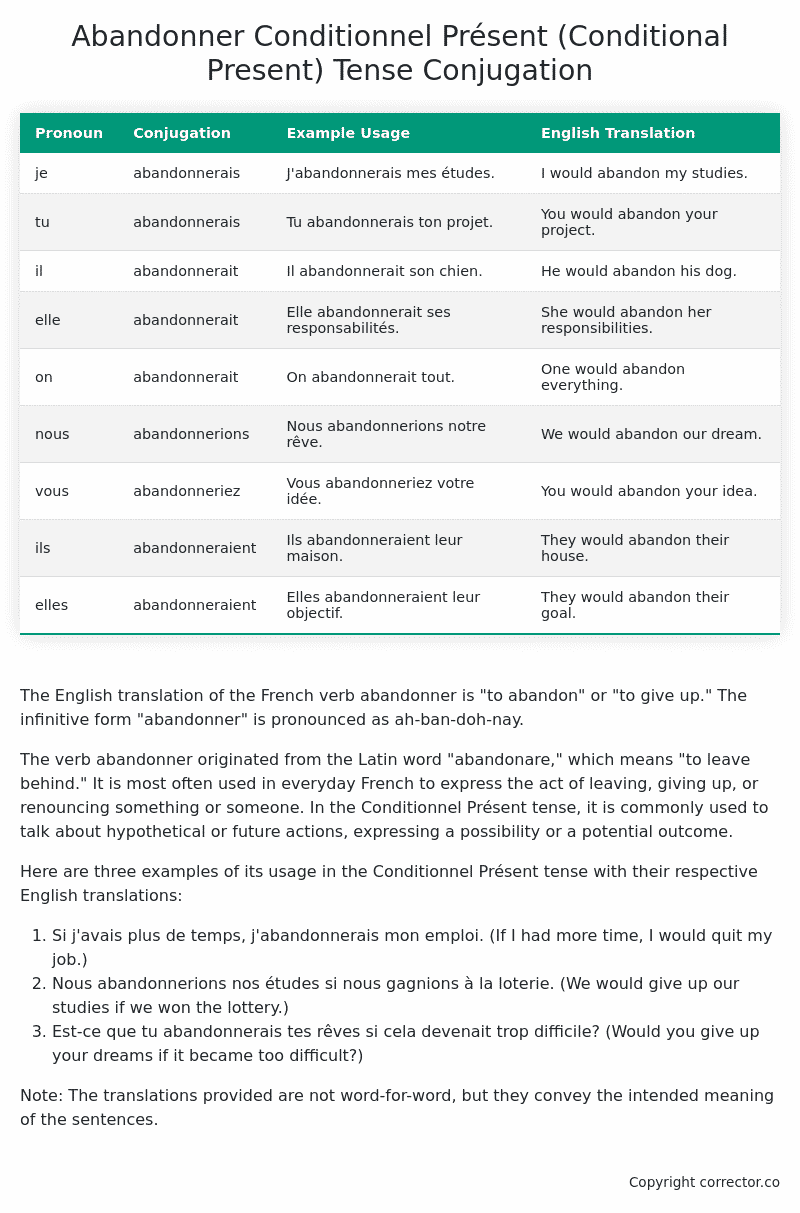Conditionnel Présent (Conditional Present) Tense Conjugation of the French Verb abandonner
Introduction to the verb abandonner
The English translation of the French verb abandonner is “to abandon” or “to give up.” The infinitive form “abandonner” is pronounced as ah-ban-doh-nay.
The verb abandonner originated from the Latin word “abandonare,” which means “to leave behind.” It is most often used in everyday French to express the act of leaving, giving up, or renouncing something or someone. In the Conditionnel Présent tense, it is commonly used to talk about hypothetical or future actions, expressing a possibility or a potential outcome.
Here are three examples of its usage in the Conditionnel Présent tense with their respective English translations:
- Si j’avais plus de temps, j’abandonnerais mon emploi. (If I had more time, I would quit my job.)
- Nous abandonnerions nos études si nous gagnions à la loterie. (We would give up our studies if we won the lottery.)
- Est-ce que tu abandonnerais tes rêves si cela devenait trop difficile? (Would you give up your dreams if it became too difficult?)
Note: The translations provided are not word-for-word, but they convey the intended meaning of the sentences.
Table of the Conditionnel Présent (Conditional Present) Tense Conjugation of abandonner
| Pronoun | Conjugation | Example Usage | English Translation |
|---|---|---|---|
| je | abandonnerais | J’abandonnerais mes études. | I would abandon my studies. |
| tu | abandonnerais | Tu abandonnerais ton projet. | You would abandon your project. |
| il | abandonnerait | Il abandonnerait son chien. | He would abandon his dog. |
| elle | abandonnerait | Elle abandonnerait ses responsabilités. | She would abandon her responsibilities. |
| on | abandonnerait | On abandonnerait tout. | One would abandon everything. |
| nous | abandonnerions | Nous abandonnerions notre rêve. | We would abandon our dream. |
| vous | abandonneriez | Vous abandonneriez votre idée. | You would abandon your idea. |
| ils | abandonneraient | Ils abandonneraient leur maison. | They would abandon their house. |
| elles | abandonneraient | Elles abandonneraient leur objectif. | They would abandon their goal. |
Other Conjugations for Abandonner.
Le Present (Present Tense) Conjugation of the French Verb abandonner
Imparfait (Imperfect) Tense Conjugation of the French Verb abandonner
Passé Simple (Simple Past) Tense Conjugation of the French Verb abandonner
Passé Composé (Present Perfect) Tense Conjugation of the French Verb abandonner
Futur Simple (Simple Future) Tense Conjugation of the French Verb abandonner
Futur Proche (Near Future) Tense Conjugation of the French Verb abandonner
Plus-que-parfait (Pluperfect) Tense Conjugation of the French Verb abandonner
Passé Antérieur (Past Anterior) Tense Conjugation of the French Verb abandonner
Futur Antérieur (Future Anterior) Tense Conjugation of the French Verb abandonner
Subjonctif Présent (Subjunctive Present) Tense Conjugation of the French Verb abandonner
Subjonctif Passé (Subjunctive Past) Tense Conjugation of the French Verb abandonner
Subjonctif Imparfait (Subjunctive Imperfect) Tense Conjugation of the French Verb abandonner
Subjonctif Plus-que-parfait (Subjunctive Pluperfect) Tense Conjugation of the French Verb abandonner
Conditionnel Présent (Conditional Present) Tense Conjugation of the French Verb abandonner (this article)
Conditionnel Passé (Conditional Past) Tense Conjugation of the French Verb abandonner
Conditionnel Passé II (Conditional Past II) Tense Conjugation of the French Verb abandonner
L’impératif Présent (Imperative Present) Tense Conjugation of the French Verb abandonner
L’impératif Passé (Imperative Past) Tense Conjugation of the French Verb abandonner
L’infinitif Présent (Infinitive Present) Tense Conjugation of the French Verb abandonner
L’infinitif Passé (Infinitive Past) Tense Conjugation of the French Verb abandonner
Le Participe Présent (Present Participle) Tense Conjugation of the French Verb abandonner
Le Participe Passé (Past Participle) Tense Conjugation of the French Verb abandonner
Struggling with French verbs or the language in general? Why not use our free French Grammar Checker – no registration required!
Get a FREE Download Study Sheet of this Conjugation 🔥
Simply right click the image below, click “save image” and get your free reference for the abandonner Conditionnel Présent tense conjugation!

Abandonner – About the French Conditionnel Présent (Conditional Present) Tense
Formation
Common Everyday Usage Patterns
Expressing Polite Requests
Expressing Hypothetical Situations
Expressing Doubt or Uncertainty
Interactions with Other Tenses
Present Tense
Past Tense
Future Tense
Conditional Perfect
Summary
Want More?
I hope you enjoyed this article on the verb abandonner. Still in a learning mood? Check out another TOTALLY random French verb conjugation!


